

If Kids Can’t Read What They Want in the Summer, When Can They? Create Great Summer Reading Experiences. I know many of us educators (and those at home) have been working hard all year to try to cultivate or protect a love of reading in our learners.
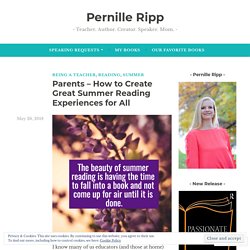
Now with warmer temperatures and summer beckoning for the Northern Hemisphere comes the real test; will kids keep reading over the summer? Is what we did enough? Did we lay enough of a foundation, get them excited, get them hooked so that the next few weeks or months will not put them in a reading drought? While time will truly be the judge of how the work might pay off, here are a few ideas that may help depending on the age of the learner. Have a to-be-read list. Visit places where books are present. Make it social. Read aloud. Use audio books. Find great books. Create a routine. Allow real choice. Have books everywhere. Celebrate abandonment, but ask questions.
Explore new books together. Be invested and interested. Keep it fun. Will school-issued devices stop the summer slide? In Mind/Shift's post "Schools Let Students Take Laptops Home in Hopes of Curbing 'Summer Slide'" (June 27, 2017), author Mollie Simon writes: “Summer is the most unequal time in America,” said Matthew Boulay, the interim CEO of the National Summer Learning Association.
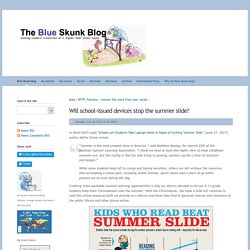
“I think we tend to have this idyllic view of what childhood summers are, but the reality is that for kids living in poverty, summer can be a time of isolation and hunger.”While some students head off to camps and family vacations, others are left without the resources that accompany a school year, including school lunches, sports teams and a place to go while parents are at work during the day.
Infographic source For me, using a device to access reading materials outside of school (including over the summer) is one of the most powerful reasons for our 1:1 program. Yet another part of Simon's article gave me pause when she observes: Summer Learning 1. NZ report into summer reading. Research confirms that summer learning loss is a reality for some New Zealand students from both low and high socio-economic groups.
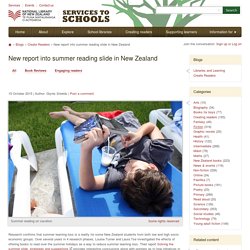
Over several years in 4 research phases, Louise Turner and Laura Tse investigated the effects of offering books to read over the summer holidays as a way to reduce summer learning loss. Their report Solving the summer slide, strategies and suggestions provides interesting conclusions along with pointers as to how initiatives in this area can be most effective. Dare to Explore. Auckland Libraries help pupils keep up over big break.
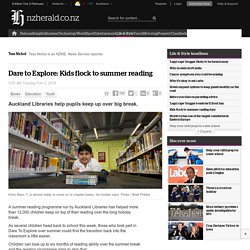
A summer reading programme run by Auckland Libraries has helped more than 12,000 children keep on top of their reading over the long holiday break. As several children head back to school this week, those who took part in Dare To Explore over summer could find the transition back into the classroom a little easier. Children can lose up to six months of reading ability over the summer break and the reading programme aims to stop that. Research by Dare To Explore in previous years has shown children with the least amount of reading confidence are the ones who benefit most from taking part.
This time around the programme saw an increase in enrolments of more than 26 per cent compared to last year, with particularly big increases in Glen Innes, Devonport and Birkenhead Libraries. Ms Carter said it seemed the programme reached more Auckland families over these holidays than ever before. "Last year I read 50 books. . . . - NZ Herald. Summer Reading: A Strategic Approach. Let Kids Pick Their Own Books. May 20, 2015 At the end of the school year, districts often send stacks of books home with their students in the hopes of combating the “summer slide,” the literacy loss experienced during the long break that hits low-income students particularly hard.
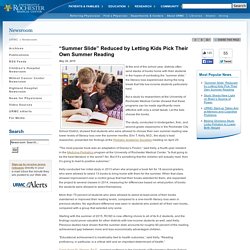
But a study by researchers at the University of Rochester Medical Center showed that these programs can be made significantly more effective with only a small tweak: Let the kids choose the books. The study, conducted in kindergarten, first-, and second-grade classrooms in the Rochester City School District, showed that students who were allowed to choose their own summer reading saw lower levels of literacy loss over the summer months. Erin T. Kelly, M.D., the study’s lead researcher, presented her findings at the Pediatric Academic Societies meeting on April 25.
“The most popular book was an adaptation of Disney’s Frozen,” said Kelly, a fourth-year resident in the Medicine-Pediatrics program at the University of Rochester Medical Center. Canadian Reading Campaign. Advice from authors. (Scholastic) As a parent, I’m already dreading the summer reading slide.
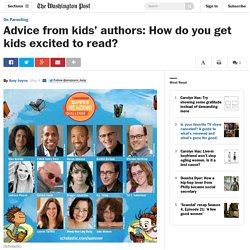
My second grader has just started to enjoy reading without much prompting, and I want to make sure that continues as the school days drop off and the long summer days begin. Scholastic thinks it has a good antidote to that slide: As kids hit certain milestones with their reading this summer, they get to “unlock” a new short story written just for the Scholastic Summer Reading Challenge by authors such as R.L. Stine, Michael Northrup, Jude Watson, Maggie Stiefvater and Jackson Pierce and many more. The authors shared advice with Scholastic about how they get kids excited about reading.
R.L. Wendy Wan-Long Shang: As a school library volunteer, I love seeing students share their favorite titles with one another. Blue Baillett: First as a classroom teacher and now as an author, I love recommending books that make kids want to bring the story alive within their own world and in their own way. Ditch Reading Lists. What does a summer vacation with required reading look like?
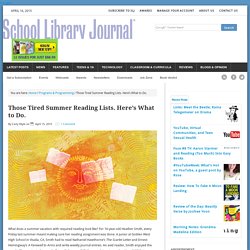
For 16-year-old Heather Smith, every Friday last summer meant making sure her reading assignment was done. A junior at Golden West High School in Visalia, CA, Smith had to read Nathaniel Hawthorne’s The Scarlet Letter and Ernest Hemingway’s A Farewell to Arms and write weekly journal entries. An avid reader, Smith enjoyed the novels. “It was nice to have a challenge,” she says. Still, the mandatory journal-writing did little to enhance her experience. Once school began, there was no discussion about the books, Smith says. Jennifer Frantz can’t blame high schoolers for taking shortcuts. Other educators agree, and advocate for students to have more summer reading options—including more contemporary choices from diverse authors.
Questioning the classics. Learning Loss Infographic. Summer Reading Slide. Raise a Reader. We’re officially kicking off our Summer Reading Challenge at Scholastic today so I thought I’d share my top 5 tips for keeping kids reading all summer long!
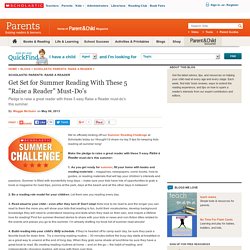
Make the pledge to raise a great reader with these 5 easy Raise a Reader must-do’s this summer: 1. As you get ready for summer, fill your home with books and reading materials – magazines, newspapers, comic books, how-to guides, or reading materials that will tap your children’s interests and passions. Summer is filled with wonderfully long days – make sure your kids have lots of opportunities to grab a book or magazine for road trips, picnics at the park, days at the beach and all the other days in between! 2. 3. 4. 5.